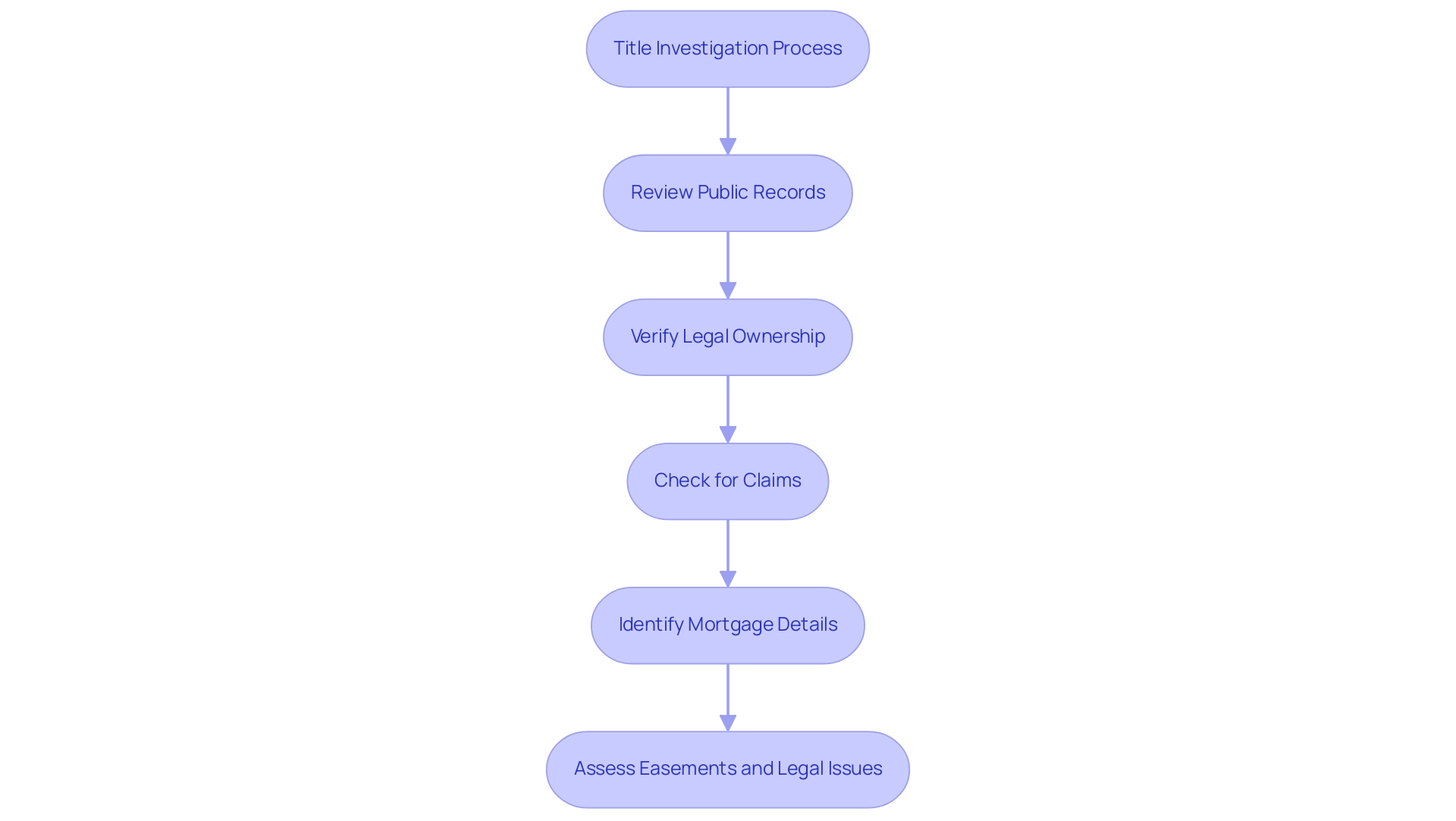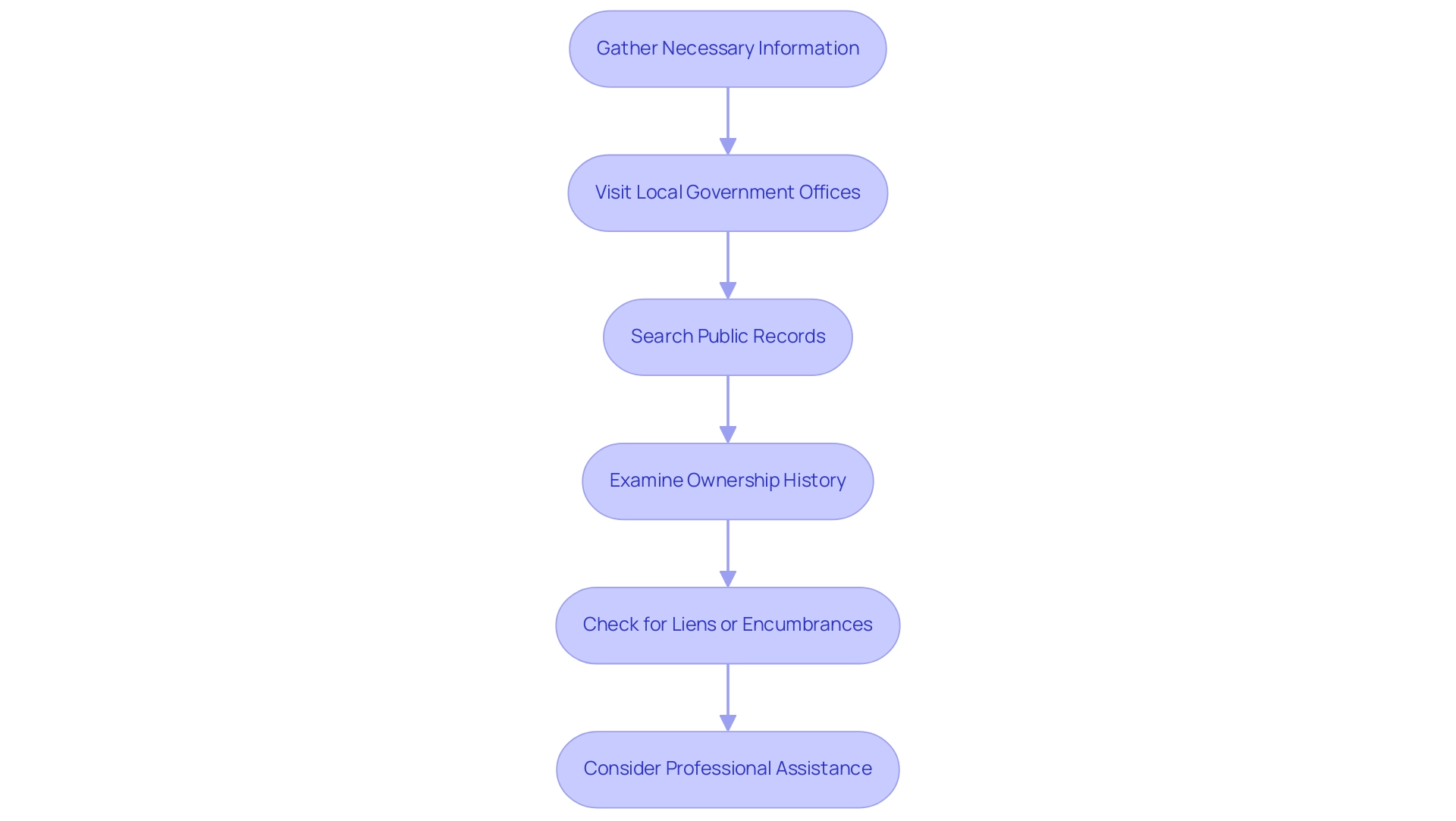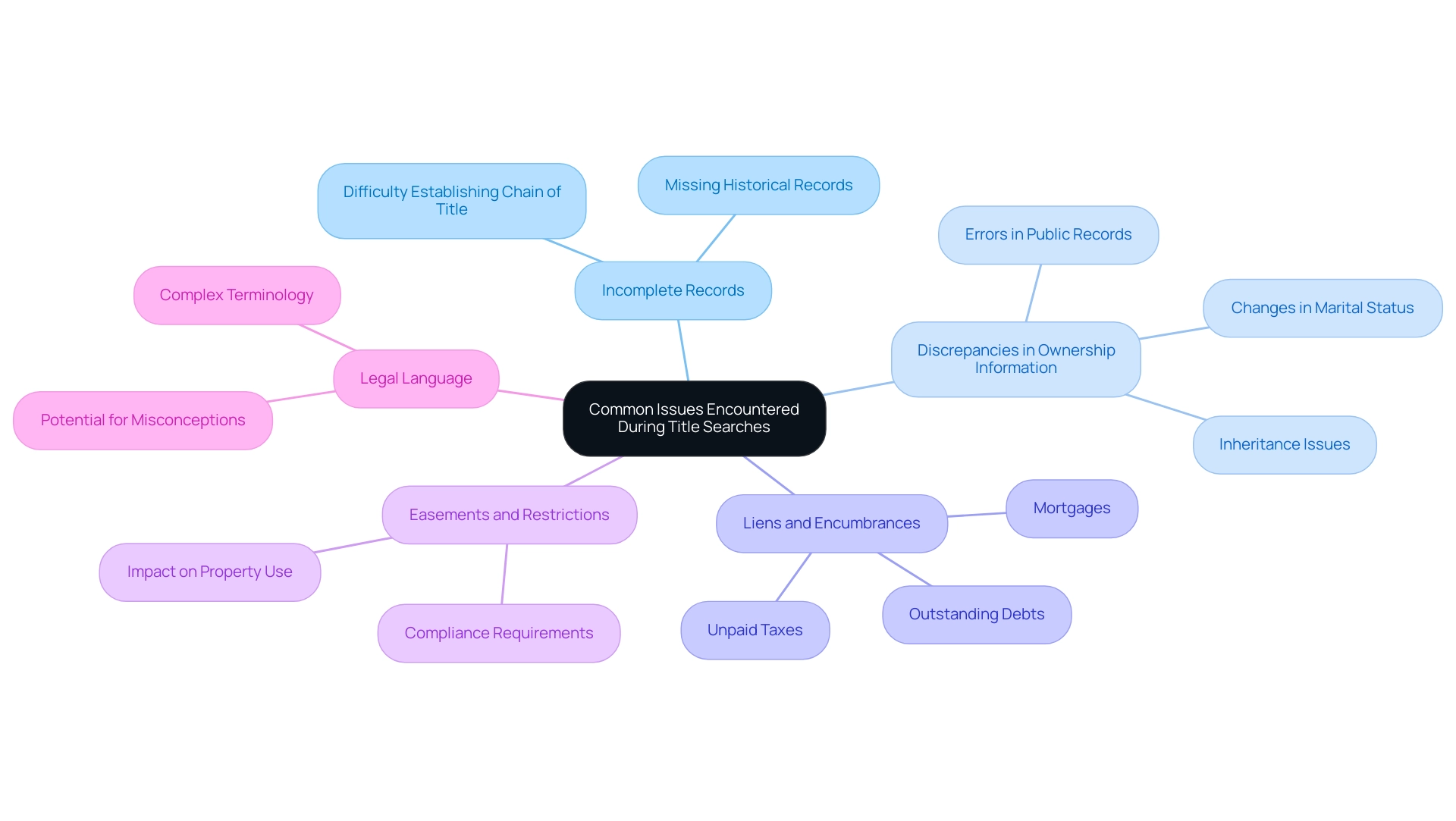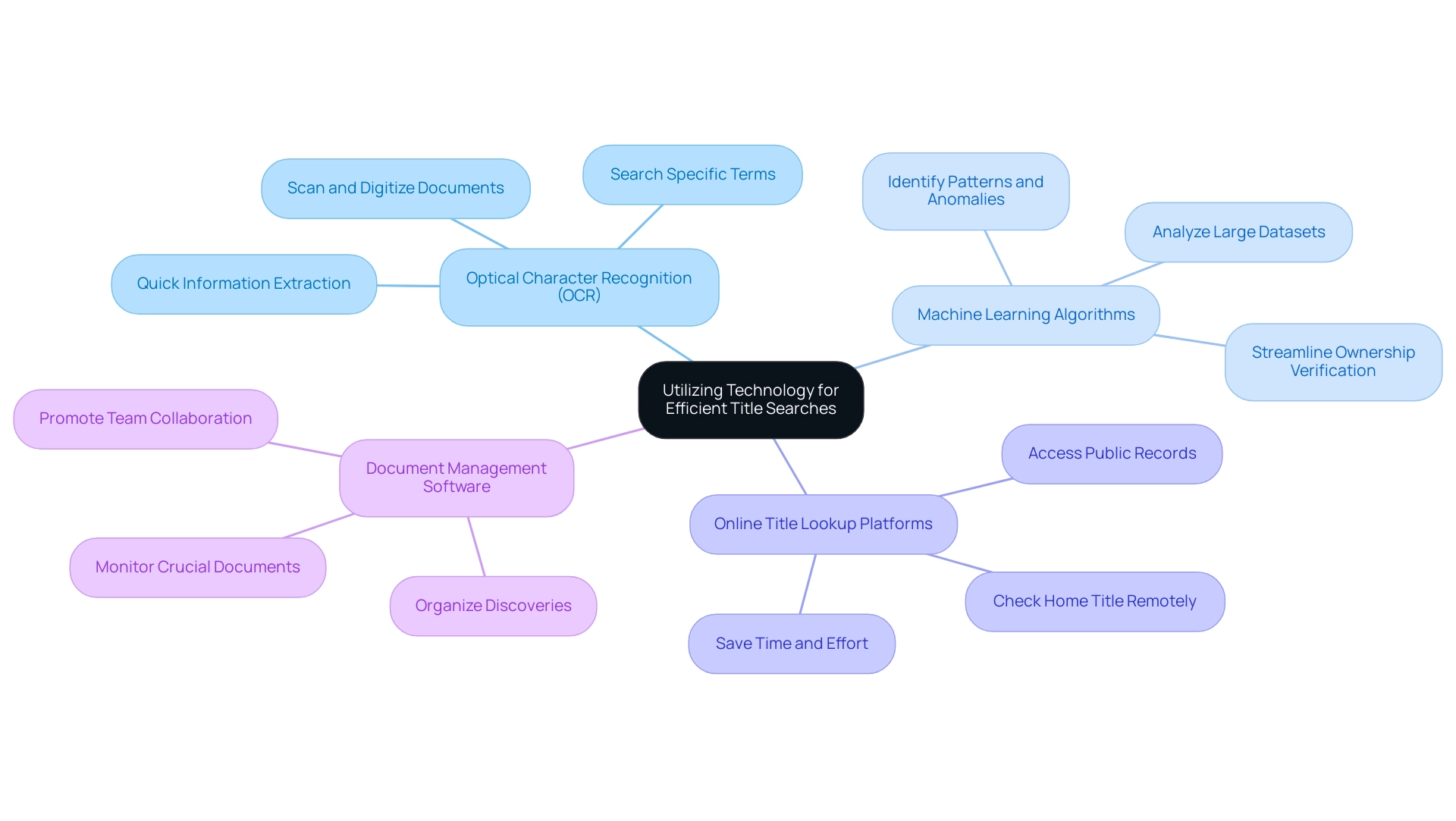Introduction
Navigating the complexities of property ownership can be daunting, yet understanding the intricacies of title searches is crucial for anyone involved in real estate transactions. A title search is not merely a formality; it is a vital process that verifies legal ownership and uncovers any potential claims or encumbrances that could jeopardize a property deal.
This article delves into the essential components of title searches, providing a comprehensive guide on how to conduct one effectively, the common challenges faced, and the role of technology in streamlining the process. Additionally, it highlights when professional assistance is warranted, ensuring that readers are equipped with the knowledge necessary to navigate their property transactions with confidence.
Understanding Title Searches: What They Are and Why They Matter
A title investigation is a procedure that entails reviewing public records to verify a real estate's legal ownership and recognize any claims against it. This process is essential for ensuring that the seller has the right to transfer ownership and that the asset is free of liens or disputes. Title investigations can reveal critical information such as:
- Mortgage details
- Easements
- Any legal issues that may affect the property
Comprehending the significance of a comprehensive examination can avert future legal issues and guarantee a seamless transaction.

Step-by-Step Guide to Conducting Your Own Title Search
To conduct your own title search, follow these steps:
- Gather Necessary Information: Start by collecting essential details about the asset, including the address, parcel number, and current owner’s name.
- Visit Local Government Offices: Go to your county's recorder or assessor's office where land documents are maintained. Many counties also offer online databases that allow you to search for records remotely.
- Search Public Records: Look for the deed, which will provide information about ownership and any recorded liens. Be sure to check for any easements or restrictions that may affect the property.
- Examine Ownership History: Investigate the chain of ownership, which displays all previous owners and transfers of the asset. This helps ensure that there are no gaps or irregularities in ownership.
- Check for Liens or Encumbrances: Identify any outstanding mortgages, tax liens, or other claims against the asset that could affect your ownership rights.
- Consider Professional Assistance: If the investigation uncovers complex issues or if you're uncertain about the results, think about hiring a real estate company or lawyer who specializes in property matters to assist you.
By following these steps, you can efficiently conduct your own property examination, ensuring that you have a clear understanding of your asset's legal standing.

Common Issues Encountered During Title Searches
During a title search, you may encounter several common issues:
- Incomplete Records: Sometimes, historical records may be missing or incomplete, making it difficult to establish a clear chain of title.
- Discrepancies in Ownership Information: Title documents may list different owners due to changes in marital status, inheritance, or errors in public records.
- Liens and Encumbrances: Outstanding debts against the asset, such as unpaid taxes or mortgages, can complicate ownership and need to be resolved before a sale.
- Easements and Restrictions: These can affect how you use your property, and understanding them is critical for compliance and future planning.
- Legal Language: Complex legal terminology can be confusing.
It's crucial to understand these documents precisely to prevent misconceptions. Being mindful of these matters enables you to approach your inquiry with caution and diligence.

Utilizing Technology for Efficient Title Searches
Incorporating technology can significantly enhance the title retrieval process. Consider the following tools:
- Optical Character Recognition (OCR): This technology enables you to scan and digitize paper documents, making it simpler to look for specific terms and extract relevant information quickly.
- Machine Learning Algorithms: These can analyze large datasets to identify patterns and anomalies, streamlining the process of verifying ownership and detecting potential issues.
- Online Title Lookup Platforms: Many services offer access to public records and show you how to check on your home title from the comfort of your home, saving time and effort.
- Document Management Software: This can assist in arranging your discoveries, monitoring crucial documents, and promoting teamwork with experts.
By utilizing these technologies, you can improve the pace and precision of your inquiries, guaranteeing a more effective procedure overall.

When to Seek Professional Help
While many homeowners can conduct their own title searches, there are instances when it is advisable to seek professional help on how to check on your home title.
- Complex Ownership Structures: If the asset has multiple owners or a complicated history, professionals like Harbinger Land can help navigate the intricacies with their expertise in mineral leasing and acquisitions. Their detailed approach includes analyzing ownership documents and historical records to clarify ownership rights.
- Legal Disputes: If there are ongoing legal issues or disputes related to the property, consulting an attorney specializing in real estate law is essential, but Harbinger Land may assist in reviewing ownership opinions as part of their comprehensive services. Their team can offer insights into potential issues that could impact ownership.
- Inconsistent Documentation: When documentation is incomplete or conflicting, a property company, such as Harbinger Land, can assist in resolving discrepancies through their in-depth and accurate research. They employ advanced methodologies, including digital record inquiries and field investigations, to ensure accuracy in property ownership.
- Time Constraints: If you are facing a strict deadline, involving experts can accelerate the document review process; Harbinger Land's improved methods can assist you in concentrating on other elements of your transaction, guaranteeing prompt completion without compromising detail.
- Peace of Mind: Engaging a professional like Harbinger Land can provide reassurance that the ownership search has been conducted thoroughly, with a focus on ensuring a clean chain of ownership, thus reducing the risk of future complications.
Furthermore, Harbinger Land offers educational outreach to inform clients about the benefits of domestic energy production and teaches them how to check on their home title, highlighting the importance of proper title management. By knowing when to seek professional assistance, you can ensure a smoother and more secure property transaction, leveraging the expertise of trusted professionals in the field.

Conclusion
Navigating the complexities of title searches is a critical aspect of real estate transactions that cannot be overlooked. A comprehensive title search not only confirms legal ownership but also reveals any claims or encumbrances that may jeopardize the deal. By following a systematic approach, from gathering necessary information to thoroughly examining public records, individuals can significantly mitigate the risks associated with property ownership.
While conducting a title search independently can be beneficial, awareness of common issues—such as incomplete records and discrepancies in ownership—is essential for a successful outcome. The integration of technology into this process has further streamlined title searches, making it easier to access and analyze information efficiently. Utilizing tools like optical character recognition and online platforms enhances both the speed and accuracy of searches, providing a modern solution to traditional challenges.
However, there are times when professional assistance becomes indispensable. Complex ownership situations, legal disputes, and inconsistent records are scenarios where expertise can provide clarity and peace of mind. Engaging professionals like Harbinger Land not only ensures thoroughness but also alleviates the burdens of time constraints, allowing for a smoother transaction process. Ultimately, understanding the importance of a meticulous title search equips individuals with the knowledge needed to navigate real estate transactions confidently, safeguarding their investments and securing their property rights.
Frequently Asked Questions
What is a title investigation?
A title investigation is a procedure that involves reviewing public records to verify the legal ownership of a real estate property and identify any claims against it. This process is crucial to ensure that the seller has the right to transfer ownership and that the property is free of liens or disputes.
Why is a title investigation important?
A title investigation is important because it helps prevent future legal issues and ensures a smooth transaction by confirming the seller's right to sell the property and identifying any existing claims or legal issues.
What critical information can a title investigation reveal?
A title investigation can reveal mortgage details, easements, and any legal issues that may affect the property.
How can I conduct my own title search?
To conduct your own title search, follow these steps: 1. Gather necessary information about the asset, including the address, parcel number, and current owner’s name. 2. Visit local government offices, such as the county recorder or assessor's office, or use online databases. 3. Search public records for the deed to find ownership information and any recorded liens. 4. Examine the ownership history to ensure there are no gaps or irregularities. 5. Check for liens or encumbrances that may affect ownership rights. 6. Consider professional assistance if complex issues arise.
What common issues might arise during a title search?
Common issues during a title search include incomplete records, discrepancies in ownership information, liens and encumbrances, easements and restrictions, and confusing legal language.
How can technology enhance the title retrieval process?
Technology can enhance the title retrieval process through tools like Optical Character Recognition (OCR) for digitizing documents, machine learning algorithms for analyzing data, online title lookup platforms for remote access to public records, and document management software for organizing findings.
When should I seek professional help for a title search?
You should seek professional help for a title search in situations involving complex ownership structures, ongoing legal disputes, inconsistent documentation, time constraints, or when you want peace of mind regarding the thoroughness of the search.




